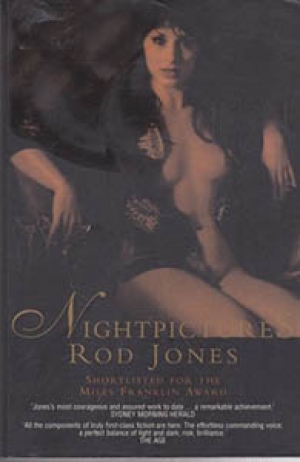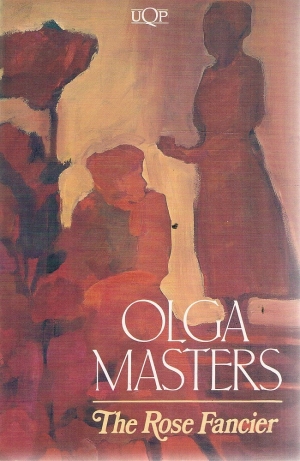Don Anderson
Don Anderson reviews 'The Idea of Perfection' by Kate Grenville
Just before the publication of her novel Dark Places in 1994, Kate Grenville said that she was thinking about her next book, ‘a heart-warming old-fashioned love story’. Well, The Idea of Perfection – and isn’t that what all love stories are about? – is that love story, though it warms both heart and head, for the bliss it affords is not so much visceral as aesthetic, even architectural.
... (read more)Just when you have been assured, and have believed, and have claimed in print in The Sydney Morning Herald that mainstream publishers no longer bring forth volumes of verse by individual poets, along comes Allen & Unwin to confound you. Well, it is good thus to be confounded. I might not have pointed out, but the publishers remind us, over Luke Davies’ name and over his title, running with light, that this book is ‘from the author of Candy’ (also published by Allen & Unwin). So, we have a case of prose piggybacks poetry, which is all right by me. Those who read Candy, that antipodean version of Romeo and Juliet on smack, for prurient reasons may, however, find running with light not their cup of tea or drug of choice. Those, on the other hand, who responded to Mr Davies’ absolute control over and cool towards his fevered material, will warm to this collection of poems. Candy was, assuredly, a poet’s novel.
... (read more)Don Anderson reviews 'My Hard Heart: Selected fiction' by Helen Garner
What do we talk about when we talk about Helen Garner? About her writing, that is, about such a consummate novella as The Children’s Bach, about extraordinary stories such as ‘A Vigil’, in Cosmo Cosmolino, about the eponymous ‘Postcards from Surfers’, and a dozen others? We talk about domestic realism, we talk about fiction that encompasses not merely the present supposedly self-obsessed Baby Boomer generation but children and grandparents also, we talk about discipline, control, and the assurance that more is less.
... (read more)Don Anderson reviews 'Nightpictures' by Rod Jones, including an author interview with Ramona Koval
A new novel from the author of Julia Paradise, of Prince of the Lilies, and most especially of Billy Sunday, aroused in this reader an excited sense of eager anticipation. Yet I was pulled up brutally short by Nightpictures’ opening sentence: ‘When we look at other people we either want to fuck them or kill them.’ It is not merely that the sententia of this sentence is demonstrably untrue, or that ‘either’ might be more elegantly placed after ‘want’, but that the sentence is, aesthetically speaking, brutal and ugly. Perhaps it is those ‘k’ sounds. This is, however, a novel narrated in the first person, and the qualities which distressed me may be those of its narrator, ‘Sailor’, who fulfils in his individual career his universal generalisation, and my reaction may be intended.
... (read more)Symposium: Are there gangsters and gatekeepers dominating public space?
John Docker
Mark Davis’ Voltairean Gangland is one of those rare books that prise open a space for revaluation of the direction of a culture. Like The Dunciad’s evocation of the Grub Street hacks of its time, Gangland exposes tentacular networks of chummy patronage, mutual puffery, and cultural power. Gangland is especially enjoyable on the clown-like behaviour of the ex-Scripsi diaspora – in a curious sexual division of labour, a B-team of male critics, captained by the felicitously named P. Craven, has successfully promoted a coterie of writers like Jolley, Garner, and Modjeska. Compared to those I analyse in Australian Cultural Elites (1974) and In A Critical Condition (1984), this new élite is the most intellectually thin in Australian cultural history. Assisted by a passive, grovelling middle-class readership, it both creates such writers as canonical and then tries desperately to shield their texts from critique and challenge.
... (read more)A masculine reader, one assumes. From that (limited) point of view, John Scott writes the most erotic prose in the country. Linda Jaivin is ham-fisted by comparison. We are talking about a textual sexuality, the kind practised so exquisitely by David Brooks in The House of Balthus. We are talking about a sexuality that may, perhaps, be possible only in language. As Helen Gamer observes in her review of John Hughes film of Scott’s novel What I Have Written: ‘I must state a painful fact; sex in a book is sexier than sex on a screen.’ (The Independent, June 1996). I must state a further painful fact: bodies get in the way. Not of sex; not of lovemaking; but of the erotic. The body trammels the imagination.
... (read more)Don Anderson reviews 'Postmodernism and Popular Culture: A cultural history' by John Docker
They fall through your letter box thick as autumnal leaves that straw the brooks in Vallombrosa, as fast and furious as knickers fall in ‘Melrose Place’ or reputations in ‘Models Inc.’ This is the new generation of academic booklists, from Routledge, from Allen & Unwin, from Polity Press, from Open University Press, from Blackwell, from Harvester Wheatsheaf, from OUP, from Cambridge UP. All proselytise on behalf of the New Orthodoxies Literary Theory and Cultural Studies.
... (read more)Letters to the Editor – August 1991
Thursday, 01 August 1991Dear Editor,
Caroline Lurie (ABR No. 131) cited four common criticisms of deconstruction. I think a more important reason is the danger deconstruction poses to the privileged position of the author as the source of one or multiple meanings for a text. It is significant to note that it is mostly the authors (both of narrative and critical discourses) who are so upset about deconstruction.
... (read more)If the proof of the pudding is in the eating, then Helen Daniel came up with a wonderful recipe indeed. Invite thirty-odd prominent Australian fiction writers to respond to Jeffrey Smart’s 1962 oil-on-plywood painting, Cahill Expressway, hung in the National Gallery of Victoria. Some declined, but twenty-nine accepted, and Helen Daniel can take great pride and satisfaction in regarding herself as a ‘privileged host’ indeed. This is truly a magic pudding of a book.
... (read more)I first made the acquaintance of Olga Masters’s writing some years back when a judge of the NSW Premier’s Literary Awards, for which her collection of stories The Home Girls had been submitted. I was immensely impressed by the control, passion, and implicit violence of the stories, and was of the impression that the book should win. But another judge, of considerable seniority, carried the day with the opinion that all the stories in the book were ‘at the same pitch’. It seemed to me at the time, and still does, that her objection could equally be levelled at, say, Flannery O’Connor or Dubliners, but that’s water under the bridge.
... (read more)







